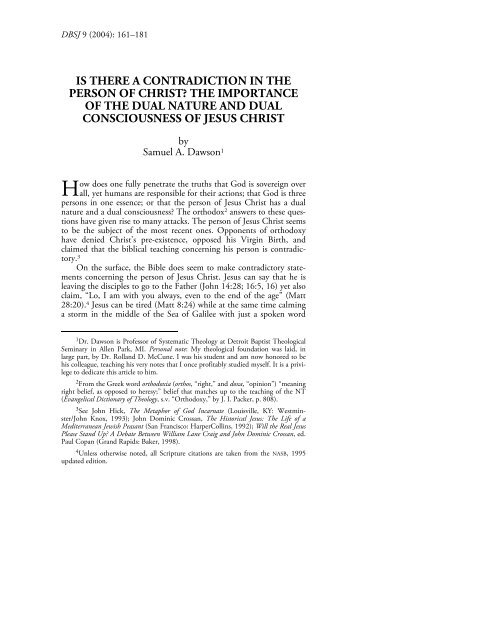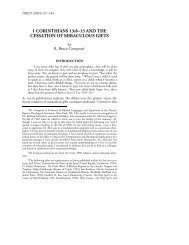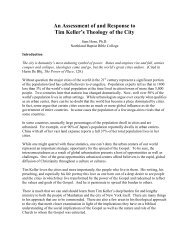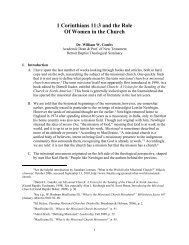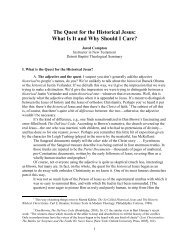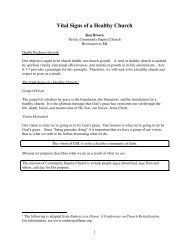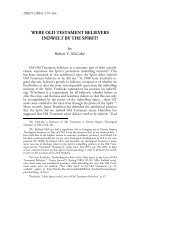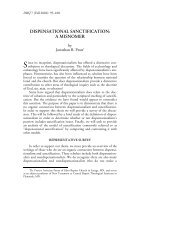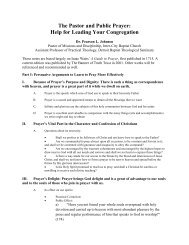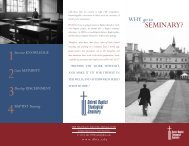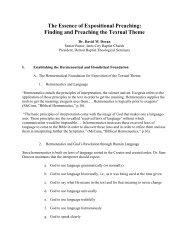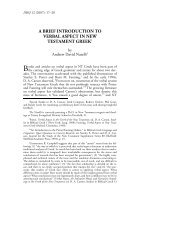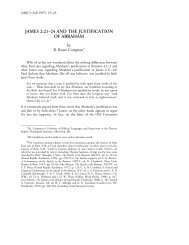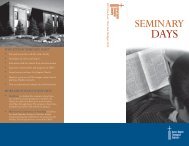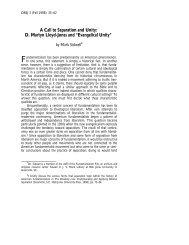Samuel A. Dawson - Detroit Baptist Theological Seminary
Samuel A. Dawson - Detroit Baptist Theological Seminary
Samuel A. Dawson - Detroit Baptist Theological Seminary
- No tags were found...
You also want an ePaper? Increase the reach of your titles
YUMPU automatically turns print PDFs into web optimized ePapers that Google loves.
DBSJ 9 (2004): 161–181IS THERE A CONTRADICTION IN THEPERSON OF CHRIST? THE IMPORTANCEOF THE DUAL NATURE AND DUALCONSCIOUSNESS OF JESUS CHRISTHby<strong>Samuel</strong> A. <strong>Dawson</strong> 1ow does one fully penetrate the truths that God is sovereign overall, yet humans are responsible for their actions; that God is threepersons in one essence; or that the person of Jesus Christ has a dualnature and a dual consciousness? The orthodox 2 answers to these questionshave given rise to many attacks. The person of Jesus Christ seemsto be the subject of the most recent ones. Opponents of orthodoxyhave denied Christ’s pre-existence, opposed his Virgin Birth, andclaimed that the biblical teaching concerning his person is contradictory.3On the surface, the Bible does seem to make contradictory statementsconcerning the person of Jesus Christ. Jesus can say that he isleaving the disciples to go to the Father (John 14:28; 16:5, 16) yet alsoclaim, “Lo, I am with you always, even to the end of the age” (Matt28:20). 4 Jesus can be tired (Matt 8:24) while at the same time calminga storm in the middle of the Sea of Galilee with just a spoken word1 Dr. <strong>Dawson</strong> is Professor of Systematic Theology at <strong>Detroit</strong> <strong>Baptist</strong> <strong>Theological</strong><strong>Seminary</strong> in Allen Park, MI. Personal note: My theological foundation was laid, inlarge part, by Dr. Rolland D. McCune. I was his student and am now honored to behis colleague, teaching his very notes that I once profitably studied myself. It is a privilegeto dedicate this article to him.2 From the Greek word orthodoxia (orthos, “right,” and doxa, “opinion”) “meaningright belief, as opposed to heresy;” belief that matches up to the teaching of the NT(Evangelical Dictionary of Theology, s.v. “Orthodoxy,” by J. I. Packer, p. 808).3 See John Hick, The Metaphor of God Incarnate (Louisville, KY: Westminster/JohnKnox, 1993); John Dominic Crossan, The Historical Jesus: The Life of aMediterranean Jewish Peasant (San Francisco: HarperCollins, 1992); Will the Real JesusPlease Stand Up? A Debate Between William Lane Craig and John Dominic Crossan, ed.Paul Copan (Grand Rapids: Baker, 1998).4 Unless otherwise noted, all Scripture citations are taken from the NASB, 1995updated edition.
162 <strong>Detroit</strong> <strong>Baptist</strong> <strong>Seminary</strong> Journal(Matt 8:26). He claims to know all that the Father is doing (John5:19–20) and yet we are told that he increased in wisdom (Luke 2:40,52) and learned obedience through the things which he suffered (Heb5:8).Thus, at one and the same time Jesus acted and spoke as both finiteand infinite, and was conscious of this fact. He was localized inbody and yet omnipresent. He could become exhausted and yet wasomnipotent. He did not know certain things and yet was omniscient.How can this be true of one person? To be both finite and infinite inone person is a contradiction, is it not? It would certainly be true forus. Why not for Christ? To answer this question we must rememberthat a true contradiction is a state of affairs that is and is not, at theexact same time and in the exact same way. 5Jesus Christ certainly claimed to be both finite and infinite at theexact same time. However, neither he nor his followers ever claimed,explicitly or implicitly, that he was finite and infinite in the exact sameway. Instead, his one self-consciousness had two distinct natures withtwo separate consciousnesses, making him both finite and infinite atthe exact same time, but never in the exact same way. As a result, JesusChrist is not contradictory in person.To prove this assertion we first examine evidence for the two distinctnatures and consciousnesses of Christ and then discuss how theycan operate in the one person without contradiction. The importanceof these truths, however, reaches far beyond the solving of a contradictionof person, so we briefly sketch out two additional benefits ofChrist’s dual nature and dual consciousness before concluding.JESUS HAS A DIVINE NATURE WHICH INCLUDESA DIVINE CONSCIOUSNESSJesus has a divine nature that exhibits divine attributes, one ofwhich is a divine consciousness. Therefore, it makes sense that he isomnipresent, omniscient. and omnipotent. To prove Christ’s divinity,we traditionally begin by noting that Scripture asserts his deity. 6 John5 Aristotle defines the principle of contradiction as follows: “Nothing can both beand not be at the same time in the same respect” (The Cambridge Dictionary of Philosophy,s.v. “Principle of Contradiction,” by Richard Purtill, p. 737).6 Brevity is allowable here since I am not attempting to defend Christ’s divinityagainst the inveterate attacks of his enemies. There is a time and place to defend, butthat is not my purpose. I only seek to explain the obvious truths of Scripture. Furthermore,I follow Dr. Rolland D. McCune’s order of argumentation in proving thedeity of Christ (Rolland D. McCune, “Systematic Theology II,” [Class Syllabus, <strong>Detroit</strong><strong>Baptist</strong> <strong>Theological</strong> <strong>Seminary</strong>, 2001] pp. 90–104). For other traditional examplesof argumentation see Francis Turretin, Institutes of Elenctic Theology, trans. GeorgeMusgrave Giger, ed. James T. Dennison, Jr., 3 vols. (Phillipsburg, NJ: Presbyterianand Reformed, 1994), 1:282–302; Charles Hodge, Systematic Theology, 3 vols. (reprint
The Dual Nature and Dual Consciousness of Christ 163proclaims, “The Word was God” (John 1:1). After meeting the postresurrectionJesus, Thomas testifies, “My Lord and My God” (John20:28). Paul proclaims in Romans 9:5, “From whom is the Christ accordingto the flesh, who is over all, God blessed forever.” In Hebrews,the Father says of the Son, “Thy throne, O God, is forever and ever”(Heb 1:8; cf. John 1:18; Phil 2:6; Titus 2:13; 2 Pet 1:1; 1 John 5:20).Second, divine names are ascribed to Christ. He is called the “Sonof God” 7 (Matt 16:15–17; 26:63–65; Luke 1:35; John 5:17–18;10:32–33, 36; 19:7). He is designated the “Lord” (Luke 2:11; John13:13; Rom 10:9; Phil 2:10–11), a name used to translate the OTname “Yahweh” in the LXX and NT (cf. Isa 40:3 with Matt 3:3, Mark1:3, Luke 3:4–6, and John 1:23; Isa 8:12–13 with 1 Pet 3:14–15; andJoel 2:31–32 with Acts 2:20–21 and Rom 10:13). He is referred to asthe “Holy One” (Acts 3:14; cf. Hos 11:9; Isa 48:17), as well as the“Alpha and Omega,” the “first and the last” (Rev 1:8; 22:13; cf. Isa44:6; 48:12–16). Isaiah calls Him “Wonderful Counselor, MightyGod, Eternal Father” (Isa 9:6).Third, divine attributes are ascribed to Christ. He has self-existentlife (John 1:4; 14:6), eternity (Isa 9:6; Mic 5:2; John 8:35; 1 John 1:2;5:11), immutability of person (Heb 1:10–12; 13:8), omnipresence(Matt 18:20; 28:20), omniscience (John 1:47; 2:24–25; 4:16–19;6:64; 16:30; 21:6, 17; Rev 2:2, 9, 13; 3:1, 8, 15; Matt 11:27; 17:24–27; Luke 5:22; 9:47), omnipotence (Phil 3:20–21; John 2:19–20;5:19b; Matt 8:26–27; Luke 4:39; 7:14–15), incomprehensibility (Eph3:19; Matt 11:27), infinity (Eph 3:8–9; Col 2:3; John 10:28), holiness(Luke 1:35; Acts 3:14; 1 John 3:5), truth (John 14:6), love (1 John3:16; Eph 3:19; Rom 8:35–39; John 13:1), righteousness (1 John 2:1;2 Tim 4:8), faithfulness (Rev 3:14; 19:11), and mercy (Jude 21; Jas5:11). In summation, Paul testifies that “in Him all the fullness of Deitydwells in bodily form” (Col 2:9).Fourth, divine works are performed by Christ. He created allthings (John 1:3, 10; Col 1:16), and continues to providentially holdall things together (Col 1:17; Heb 1:3). As a result, he controls all history(Heb 1:2; 1 Cor 10:4, 9, 11; Rev 1:20; 5:5; 6:1, 5, 7, 9). He forgivessin and gives eternal life to those whom the Father has given himed., Grand Rapids: Eerdmans, 1982), 1:483–521; Millard J. Erickson, Christian Theology,2nd ed. (Grand Rapids: Baker, 1998), pp. 699–720; Augustus Hopkins Strong,Systematic Theology (Valley Forge, PA: Judson, 1907), pp. 305–15; Robert L. Reymond,A New Systematic Theology of the Christian Faith (Nashville: Nelson, 1998),pp. 211–312; Wayne Grudem, Systematic Theology (Grand Rapids: Zondervan, 1994),pp. 543–54.7 When Jesus called God his Father, the Jewish leadership knew that he was makinghimself equal with God (John 5:18). Thus, the title “Son of God” speaks toChrist’s divine nature.
164 <strong>Detroit</strong> <strong>Baptist</strong> <strong>Seminary</strong> Journal(Mark 2:5–12; John 10:28). He builds the church of which he is thehead (Matt 16:18; 1 Tim 3:15; Eph 4:7–16). He answers prayer (John14:14; 2 Cor 12:7–9), a prerogative of deity. He is the resurrectionand the life, the one who raises the dead (John 5:21, 28–29; 11:24–25). It is he who will judge the world (John 5:22; Acts 10:42; 17:31;Matt 25:31–46; 2 Cor 5:10). And in the end, he will make all thingsnew (Rev 21:5).Fifth, Christ demands equal honor with his Father (John 5:23). Assuch, he encourages and accepts worship of himself (Matt 14:31–33;15:25–28; 28:9–10; 16–18; John 9:35–39). The Father even commandsthe angels to worship him (Heb 1:6), which they do (Rev 5:8).Eventually every knee will bow in submission to Jesus Christ (Phil2:10–11). Since God alone is to be worshipped (Matt 4:8–10), notangels (Rev 22:8–9) or apostles (Acts 10:25–26; 14:11–15); Jesus isGod.Sixth, Christ has authority over God’s laws and institutions. He isgreater than the temple (Matt 12:6). The Son of Man is “Lord of theSabbath” (Matt 12:8). He is the supreme interpreter of the MosaicLaw (Matt 5:31–34, 38–39). He is the one who gives the keys of theKingdom of Heaven to the church (Matt 16:19), over which he is thehead (Eph 1:21–22). Thus, he is divine.Finally, he is the object of saving faith on an equal plane with theFather. Jesus said, “Believe in God, believe also in me” (John 14:1). Hereinforced this truth in his great high-priestly prayer: “And this is eternallife, that they may know You, the only true God, and Jesus Christwhom You have sent” (John 17:3). Yet Jesus is also the exclusive focusof salvation. For example, John 3:36 reads, “He who believes in theSon has eternal life” (cf. Matt 10:37; 11:28). Thus, Scripture inescapablyconcludes that Jesus Christ is God. He has a divine nature.The Divine NatureBefore we go further we need to define the term nature. A naturemay be viewed as a complex of attributes. 8 For example, the nature of aball is its roundness, either spherical (e.g., baseball), or oblique (e.g.,football). A ball, then, has the attribute of roundness, among otherthings.The divine nature is also a complex of attributes. We have notedseveral of these: omnipresence, omniscience and omnipotence. Each ofthese attributes refers to different qualities found in the divine nature.The attribute of omniscience means that Jesus knows all things past,present, and future, both simultaneously and thoroughly. The8 William W. Combs, “Does the Believer Have One Nature or Two?” <strong>Detroit</strong><strong>Baptist</strong> <strong>Seminary</strong> Journal 2 (Fall 1997): 83–87.
The Dual Nature and Dual Consciousness of Christ 165attribute of omnipresence means that Jesus is everywhere present in thewhole of his divine essence at the exact same time. The attribute ofomnipotence means that Jesus can do all things consistent with hisnature. Nothing is too difficult for him. While each of these attributeshas separable “talking-points,” all of them inhere in unity in the divinenature of Jesus Christ.Furthermore, Jesus’ divine nature has the attribute of consciousness.A divine consciousness is as much an attribute of Jesus’ divinenature as is his omniscience. Inanimate objects do not have the attributeof consciousness. Our “proverbial” ball has certain attributes whichgive it a “ball” nature, but it lacks consciousness. A divine consciousnessis an indispensable attribute of the divine nature.The Divine ConsciousnessSo what can we say about consciousness? I believe we can defineconsciousness as a complex of awarenesses. Natures, as we have suggested,are complexes of attributes. But awarenesses are different thanattributes. An attribute is a characteristic of a person, place, or thingthat is part of its nature. An awareness is a characteristic of consciousnessand is therefore only the property of a sentient life-form…animalsand persons. 9Animals have an awareness of their physical being. They have,what we might call, an “animal” consciousness. That is, they have aphysical awareness of when they are tired, hungry, etc., and they dosomething about it. However, persons have awarenesses that transcendthe physical. They, also, have rational, spiritual, and moral awarenesses.Jesus, as a person, has a divine nature, which includes a divineconsciousness. He is always aware of who he is as God the Son. He isaware that he came down from Heaven (John 6:38). He is aware thathe is everywhere present (Matt 28:20) even though he has a localizedbody. He is aware of his knowledge of all things. For example, heknows where to send Peter to fish in order to obtain money for taxesfrom the fish’s mouth (Matt 17:24–27). He is aware that he can do allthings in keeping with his character. He knows that he and his disciplesare not at risk in the boat being tossed about in a storm on the Seaof Galilee. He is able to still the storm (Matt 8:26–27) because all elementsof nature report to him.Furthermore, Jesus is aware of his Father’s will. He came into the9 Plants, for example, do not have the attribute of consciousness. They do not experienceawareness. They merely react to their environment chemically or mechanically.Plants have a plant nature, but consciousness (a complex of awarenesses whichincludes self-knowledge) is not one of them.
166 <strong>Detroit</strong> <strong>Baptist</strong> <strong>Seminary</strong> Journalworld to do it (Heb 10:5–7). He alone knows the Father and only theFather knows who Jesus truly is. If one desires to know the Father,then he must listen to the Son who reveals him (Matt 11:27). And ifone wants to know the Son, then he must listen to the Father, whoalone reveals him (Matt 16:15–17).In his divine nature Jesus is aware of all his divine attributes andtheir powers perfectly and experientially. He is also aware of all hiscreation’s natures, attributes and respective powers perfectly, but notexperientially through the divine nature alone. This is because he has adivine nature and a divine nature by definition has a divine consciousness,not a human consciousness and certainly not an animal consciousness.So when Jesus makes statements and performs certain actsthat are consistent with a person who is omniscient, omnipresent, andomnipotent, it makes sense because he has a divine nature which includesa divine consciousness.JESUS HAS A HUMAN NATURE WHICH INCLUDESA HUMAN CONSCIOUSNESSThe text of Scripture also is clear that Jesus is human. He has ahuman nature that exhibits human attributes, one of which is a humanconsciousness. Therefore, it makes sense that he is localized, progressesin knowledge, and, at times, becomes tired, hungry and thirsty.Most believe that Jesus is human. There are several reasons forthis. 10 First, Jesus directly asserted that he is a man. He told thecrowds, “You are seeking Me, a man who has told you the truth”(John 8:40). Peter calls Jesus “a man attested to you by God” (Acts2:22). Paul also testifies that the only mediator between God and manis “the man Christ Jesus” (1 Tim 2:5; cf. Rom 5:15 and 1 Cor 15:21).Second, Jesus calls himself the “Son of Man.” While this is clearlya Messianic title, 11 it also demonstrates that Jesus partook of the characterqualities of a man. He was born of the seed of David according tothe flesh (Rom 1:3). Thus, he was a descendent of Israel (Rom 9:5)who partook of flesh and blood like all humanity (Heb 2:14).Third, Jesus had a body (John 2:21; Matt 26:26, 28; Luke 24:39;Heb 2:14), a soul (Matt 26:38; John 12:27), and a spirit (Luke 23:46;John 11:33). In this body, soul, and spirit, he developed as a normal10 Again, I follow, for the most part, McCune’s order of argumentation for provingJesus’ humanity (McCune, “Systematic Theology II,” pp. 104–8). For other traditionalsupport see Erickson, Christian Theology, pp. 721–38; Grudem, SystematicTheology, pp. 529–43; Strong, Systematic Theology, pp. 673–81; William G. T. Shedd,Dogmatic Theology, 3rd ed., ed. Alan W. Gomes (Phillipsburg, NJ: Presbyterian &Reformed, 2003), pp. 646–48.11 Reymond, New Systematic Theology, pp. 215–18.
The Dual Nature and Dual Consciousness of Christ 167human. He had a pre-natal period where Mary carried him in herwomb (Luke 2:5). She gave birth to him (Luke 2:12) and he “continuedto grow and become strong, increasing in wisdom” (Luke 2:40).He grew up a carpenter’s apprentice to Joseph and died at the approximateage of 33 (cf. Luke 3:23). He was human.Fourth, Jesus exhibited the attributes of a human being. He hademotions like compassion (Matt 9:36), anger (Mark 3:5), love (Mark10:21; John 13:23), sorrow (John 11:35; 12:27) and agony (Luke22:44). He became hungry (Matt 4:2), thirsty (John 19:28), and tired(John 4:6; Matt 8:24). He was inquisitive (Luke 2:46) and learned theconsequences of obedience (Heb 5:7–8), even to the point of death(Luke 22:42; Matt 26:39; Phil 2:6–8). He also prayed (Matt 14:23).Fifth, being human, he appeared human. He looked like a man.Some mistook him for John the <strong>Baptist</strong> or Elijah. Still others mistookhim for Jeremiah (Matt 16:13–14). The woman at the well recognizedthat he was a Jew (John 4:9), and Mary thought he was a gardener(John 20:15). He looked like a man, because he was a man. 12The Human NatureIt is an obvious conclusion that Jesus had a human nature. He hada complex of attributes that are the properties of a human nature. Hewas localized in place. It could be said of Jesus that he was in Bethlehem,or Galilee, or Samaria, or Jerusalem. It was never said of him thathe was bodily in Jerusalem and Galilee at the same time. A human naturecannot do this, for a body, which is a property of the human nature,is not ubiquitous. 13Furthermore, Jesus grew in wisdom (Luke 2:40, 52). Certainlygrowing in wisdom includes growth in knowledge. Jesus learned to eat,to talk, to read, and to write. He learned the experience of obedience,yet never learned the experience of disobedience. In his human naturehe was not omniscient. A human nature does not have the property ofomniscience. It is finite in knowledge, not infinite. 1412 Scripture does tell us that he lacked one thing human beings have. He lacked asin nature (Heb 4:15–16; Rom 8:3; 2 Cor 5:21). Yet a sin nature is not a necessarycharacteristic of humanity. Adam and Eve also lacked one before their first sin andboth were human from the beginning. So Jesus was human, yet had no sin nature.13 Contra the Lutheran view. For the Lutheran view of Christ’s ubiquity, see HaroldO. J. Brown, Heresies: The Image of Christ in the Mirror of Heresy and Orthodoxyfrom the Apostles to the Present (Grand Rapids: Baker, 1984), pp. 317–26.14 It does not follow from this that Jesus ever thought wrongly or forgot things.Wrong thinking and forgetfulness are not predicated of man before the Fall. It is notan inherent attribute of human nature. For the possibility that Jesus forgot things inhis human nature see Shedd, Dogmatic Theology, p. 620.
168 <strong>Detroit</strong> <strong>Baptist</strong> <strong>Seminary</strong> JournalMoreover, Jesus was limited in power as a human. As noted, hetired and became hungry and thirsty. He could not continue to functionwithout food to eat, water to drink, and air to breathe—all functionsof a human nature existing upon earth. In his human nature, hewas not omnipotent. He could not do all things. A human nature doesnot have the power of omnipotence. It is finite in ability, not infinite. 15The Human ConsciousnessJesus was aware of his limitations as a human, because he had ahuman consciousness as an attribute of his human nature. Jesus wasaware that he could not be everywhere present in his body. He couldnot be in Jerusalem and Bethlehem bodily at the same time. Jesus alsowas aware of his limitation in power as a human. He needed sleep,while God never slumbers nor sleeps (Ps 121:3–4). He needed food tosustain His energy (Matt 4:2) while God is never hungry. He becamethirsty on the cross (John 19:28), while God in the divine essence doesnot know thirst by experience.Furthermore, Jesus was aware that his human nature did not knowall things (Mark 13:32; Matt 24:36). He progressed in knowledge andwisdom, just as he grew in stature (Luke 2:40, 52). Exactly when Jesusrecognized that he was the Messiah from the standpoint of his humanconsciousness is difficult to say. It seems that his human consciousnesswould not have known that he was the Messiah in the womb or as anewborn baby. However, by the time he turned twelve we find him inhis “Father’s house” (Luke 2:42–51) listening to the teachers and askingthem questions (Luke 2:49). So by the age of twelve he knew thathe was the Son of God.In all likelihood, early in his infancy, he quickly but progressivelycame to know the significance of his work on the earth. He alwaysknew the will of the Father perfectly, and without taint of sin when hewas supposed to know it, for the Father and the Logos revealed it directlyto his human nature. 1615 This limitation is not a sin. Man, as a created being, was created finite in ability.It is the order of things for a human nature to have finite ability as a property.Even glorified humanity, with all the wonderful change that God will perform, willcontinue to be finite in location, knowledge, and ability. And this is true of Jesus’human nature as well.16 Jesus came to identify Himself as Messiah in his human consciousness by directrevelation from God, not by sheer human reasoning. At what stages and how fast thisdirectly revealed knowledge was vouchsafed to the human consciousness, we do notknow. Scripture is silent on the subject. But that it was progressive in nature it seemssafe to say, since a human consciousness develops in knowledge and awareness frominfancy to adulthood. Furthermore, even near the end of his life on earth, Jesus stilldid not know the exact time of his return (Mark 13:32; Matt 24:36). So, Jesus progressedin awareness and knowledge from the standpoint of his human consciousness.
The Dual Nature and Dual Consciousness of Christ 169Certainly Jesus, as human, was aware of his finite limitations.However, at a certain time his human consciousness, also, becameaware that he, as a person, through the divine nature was omnipresent,omniscient, and omnipotent. And although he knew these things ofthe Logos by revelation, his human nature was never experientiallyaware of these things through the human nature alone. This is becausehe had a human nature, and a human nature by definition has a humanconsciousness, not a divine consciousness. So when Jesus madestatements and performed certain acts consistent with a person who islocalized, progressing in knowledge, and limited in certain powers, itmakes sense because he had a human nature which included a humanconsciousness.JESUS HAS A DUAL NATURE AND DUALCONSCIOUSNESS UNITED IN ONE PERSONOne could posit just a human Christ or just a divine Christ andnot have to deal with the problem of contradiction in person. The rubcomes when we posit, on the basis of Scripture, that Jesus possessedboth natures and consciousnesses united in one person. As such, he isboth finite and infinite at the exact same time, a statement that leads tothe charge of contradiction. This charge, however, is proven false whenwe understand how Christ’s dual nature and dual consciousness operatewithin the one person.A History LessonAt this point, a history lesson should help us understand the issuesa little better. Opponents of orthodox Christianity have attacked theperson of Jesus from the very beginning. Second-century Ebionitesdenied the genuineness of Jesus’ deity, rejecting Jesus’ pre-existenceand virgin birth and teaching that Jesus was a human son of Josephand Mary. They argued that the Father bestowed the Spirit on Jesus athis baptism because of his legal obedience, and only in this regard heldhim in high honor. Ebionism was simply Judaism corrupting parts ofthe church with its error. 17Late in the first-century, a sect called Docetism denied the genuinenessof Jesus’ humanity. They argued that Jesus only appeared to behuman. To them, Jesus could not have had a “real” material body becausethe material world was evil; therefore, Jesus was not truly human.Docetism was simply pagan Greek philosophy infiltrating the17 H. Wayne House, Charts of Christian Theology and Doctrine (Grand Rapids:Zondervan, 1992), pp. 53, 55; Erickson, Christian Theology, pp. 710–11; Strong, SystematicTheology, pp. 669–70; Evangelical Dictionary of Theology, s.v. “Ebionites,” byV. L. Walter, pp. 339–40.
170 <strong>Detroit</strong> <strong>Baptist</strong> <strong>Seminary</strong> Journalchurch. 18During the fourth century, Arius propagated an idea similar tothat of the Ebionites. He also deprecated the divine nature, but ratherthan denying its outright genuineness, he denied its equality with theFather and thus denied its completeness. Although Arianism taughtthat the Logos predated Bethlehem, to Arians, he was created by theFather and of a different essence. He was of “like” essence (homoiousia),not of the “same” essence (homoousia). This Logos wasunited to Jesus, but Jesus was less than deity to Arius. 19Also during the fourth-century, Apollinarius denied the completenessof Jesus’ human nature. Apollinarianism reached farther towardthe truth than Doceticism, which denied the human nature of Christaltogether. Rather, Apollonarianism taught that Jesus, being God, receiveda body and a soul but no rational element, which Apollinariusposited was a function of the spirit in man. To him, Christ did nothave a human spirit. Therefore, the Logos assumed an irrational humannature, which impugned its integrity. 20A fifth-century heresy advocated by Nestorius a bishop of Constantinople,denied the union of Jesus’ human nature and divine nature.There was no real incarnation, only an alliance between God andman. So Jesus was actually two persons, not one, with the human naturebeing completely controlled by the divine. Nestorianism deniedthe union of the two natures in one person. 21Finally, also in the fifth century, Eutychius, a leader of a monasteryin Constantinople, denied a proper union of the two natures inone person. To him, after the incarnation, the human nature of Jesuswas swallowed up in the divine nature, thus creating a third nature[tertium quid]. Neither nature was actually the same after the fusion.The human nature was different than other human natures and thedivine nature was different than the divine nature of the Son of Godfrom eternity past. Jesus was neither human nor divine to Eutychius. 2218 House, Charts of Christian Theology, pp. 53, 55; Erickson, Christian Theology,pp. 729–30; Strong, Systematic Theology, p. 670; Evangelical Dictionary of Theology,s.v. “Docetism,” by G. L. Borchett, p. 326.19 House, Charts of Christian Theology, pp. 53, 55; Erickson, Christian Theology,pp. 711–15; Strong, Systematic Theology, p. 670; Evangelical Dictionary of Theology,s.v. “Arianism,” V. L. Walter, pp. 74–75.20 House, Charts of Christian Theology, pp. 54–55; Erickson, Christian Theology,pp. 730–32; Strong, Systematic Theology, pp. 670–71; Evangelical Dictionary of Theology,s.v. “Apollinarianism,” by V. L. Walter, pp. 67–68.21 House, Charts of Christian Theology, pp. 54–55; Erickson, Christian Theology,pp. 743–44; Strong, Systematic Theology, pp. 671–72; Evangelical Dictionary of Theology,s.v. “Nestorius, Nestorianism,” by H. Griffith, pp. 758–59.22 House, Charts of Christian Theology, pp. 54–55; Erickson, Christian Theology,
The Dual Nature and Dual Consciousness of Christ 171These six heresies seem to sum up all heresies concerning the personof Christ to one extent or another. Heresies denigrate the divinenature of Christ by either denying its existence (Ebionism) or arguingthat it is incomplete, not equal with the Father’s (Arianism). Otherheresies do damage to the human nature by either denying its reality(Doceticism) or arguing that it is incomplete (Apollinarianism). Finally,other heresies denounce the proper union of the natures in theone person of Christ by either dividing the natures to make two people(Nestorianism) or combining the natures into one, thus creating athird nature (Eutychianism). 23The church councils at Nicea (A.D. 325) and Constantinople (A.D.381), the Synod of Ephesus (A.D. 431), and the Council of Chalcedon(A.D. 451) were convened to counteract these heresies and state thetruth concerning Jesus’ person. The Council of Chalcedon achievedconsensus on a fairly complete statement that all orthodox scholarshave since accepted as true to biblical teaching. A portion of the statementreads as follows:We, then, following the holy Fathers, 24 all with one consent, teach mento confess one and the same Son, our Lord Jesus Christ, the same perfectin Godhead and also perfect in manhood; truly God and truly man, of areasonable [rational] soul and body; consubstantial [coessential] with theFather according to the Godhead, and consubstantial with us accordingto the Manhood; in all things like unto us, without sin; begotten beforeall ages of the Father according to the Godhead, and in these latter days,for us and for our salvation, born of the Virgin Mary, the Mother ofGod, according to the Manhood; one and the same Christ, Son, Lord,Only-begotten, to be acknowledged in two natures, inconfusedly, unchangeably,indivisibly, inseparably; the distinction of natures being by nomeans taken away by the union, but rather the property of each naturebeing preserved and concurring in one Person and one Subsistence, notparted or divided into two persons, but one and the same Son, and onlybegotten, God, the Word, the Lord Jesus Christ, as the prophets fromthe beginning [have declared] concerning him, and the Lord Jesus Christhimself has taught us, and the Creed of the holy Fathers has handeddown to us. 25Against Ebionism and Arianism, Chalcedon stated that Jesus didpp. 744–47; Strong, Systematic Theology, p. 672; Evangelical Dictionary of Theology,s.v. “Monophysitism,” by D. A. Hubbard, p. 730.23 Strong, Systematic Theology, p. 672, and Erickson, Christian Theology, p. 738,for helpful summaries.24 “Following the holy Fathers” in regards to the Nicene Creed.25 English translation from Philip Schaff, The Creeds of Christendom, rev. David S.Schaff, 3 vols. (Grand Rapids: Baker, 1985), 3:62–63.
172 <strong>Detroit</strong> <strong>Baptist</strong> <strong>Seminary</strong> Journalhave a divine nature and it was equal with the Father’s. He was “perfectin Godhead”; “truly God”; “consubstantial with the Father accordingto the Godhead”; “begotten before all ages of the Fatheraccording to the Godhead”; 26 “God.”Against Doceticism and Apollinarianism, Chalcedon stated thatJesus did have a real and complete human nature. He was “perfect inmanhood”; “truly man”; “consubstantial with us according to themanhood”; “in all things like unto us, without sin”; “born of the VirginMary, the Mother of God, according to the Manhood.”Against Nestorianism, Chalcedon decreed that Jesus’ two natureswere united in one person. The statement reads, “The property of eachnature being preserved and concurring in one Person and Subsistence,not parted or divided into two persons.” Against Eutychianism, Chalcedondeclared, “…to be acknowledged in two natures, inconfusedly,unchangeably, indivisibly, inseparably; the distinction of natures beingby no means taken away by the union, but rather the property of eachnature being preserved and concurring in one Person and subsistence.”The importance of Chalcedon’s statement becomes apparent forour discussion. It summarily taught that we must neither divide the personnor confound the natures. Thus, Chalcedon presents us with a problembut also offers a solution. The problem is that the actions andstatements of this one person seem contradictory. How can one personbe omnipresent and not omnipresent at the same time? How can oneperson be omniscient and not omniscient at the same time? How canone person be omnipotent and not omnipotent at one and the sametime? The solution to this problem is found in not confounding thedual nature and dual consciousness of the God-man. For there to be acontradiction, Jesus must be both omniscient and not omniscient,omnipresent and not omnipresent, omnipotent and not omnipotent atthe exact same time and in the exact the same way. Since Jesus has adual nature and a dual consciousness, he is never all these things in theexact same way. To defend this position, we consider several basictruths concerning how Christ’s dual nature and dual consciousnessoperate within the one person.Christ’s Natures Do Not ConflictEven though Christ has two distinct natures, neither nature conflictswith the other, thereby producing a contradiction in statement oraction. This is because the divine nature of the Logos is the higher,controlling nature in the God-man.Before the incarnation, the Logos, existed as the Second Person of26 Grudem, Systematic Theology, pp. 244–45; Evangelical Dictionary of Theology,s.v. “Only Begotten,” by E. F. Harrison, p. 799.
The Dual Nature and Dual Consciousness of Christ 173the Trinity, but the theanthropic person (God-man) did not exist. “Jesus”did not exist until the Logos assumed into his person a humannature derived from a human mother at the incarnation. It was onlythen, in fulfillment of prophecy, that Mary called his name “Jesus.”Moreover, at the incarnation the Logos assumed into his personan unindividualized human nature. 27 We would not address the humannature which Christ assumed before the incarnation as “you.” 28Rather, we address it as a part of the lump of clay called humanity,unindividualized at this point.The human nature which Christ assumed at his incarnation didachieve personal existence, but only in the person of the Eternal Son. Itdid not gain its own unique personhood distinct from the Logos; instead,this genuine human nature, having all the properties pertainingto a human nature, was personalized in the Second Person of the Trinity.29 Thus, it became fully functioning and individualized in the Godman.The Logos, then, changed only by addition, not conflation. Headded to himself a human nature, which was personalized through hisown person and included a human consciousness. 30 As a result, the27 Personality, then, is not an essential part of a genuine human nature.28 Christ did not assume a human person, with the divine person taking over atincarnation, or we have a form of Nestorianism. Contra Erickson, Christian Theology,pp. 748–49. I agree with Murray that “the very notion of personality can never bepredicated of [the incarnate Son] except as it draws within its scope his specificallydivine identity. And if this is so, it is not feasible to speak of his ‘human personality’”(John Murray, review of D. M. Baillie, God Was in Christ, in Collected Writings of JohnMurray, 4 vols. [Edinburgh: Banner of Truth, 1976–1982], 3:343).29 At incarnation, the essence of the Trinity did not change so that the Trinity’sessence now contains both a body and a soul. Rather, the essence of the Trinity remainsthe same, with the Second Person of the Trinity remaining an equal part of theone essence. The Son of God did not assume a human nature into the unity of Trinity.Instead, the Second Person of the Trinity, Himself, assumed a human nature andpersonalized it in the unity of his own person (see Shedd, Dogmatic Theology, p. 641,supplement 5.1.1).30 One may ask whether this human nature, personalized through the Logos, hasa legitimate human consciousness or not. If in its unindividualized form it is not personal,then when did its human consciousness come into existence, if it did? We answerthis question by first noting that one of the attributes of a fully operatingpersonalized human nature is consciousness. For example, plants do not enjoy consciousness.God, carefully, distinguishes between plants and animals/man during Hisaccount of creation. Animals and men are called “living creatures” or “living-souls”(Gen 1:20–21, 24; 2:7), while plants are not referred to in this way. I propose that thedifference between plants and animals is that plants do not have an awareness of physicallife. Thus, a plant’s nature does not enjoy the property of consciousness. Animallife does, but its consciousness terminates in an awareness of the physical, while a humannature’s consciousness expands to include physical, spiritual, moral and rationalpowers. A genuine, individualized human nature, then, has a consciousness that is
174 <strong>Detroit</strong> <strong>Baptist</strong> <strong>Seminary</strong> JournalLogos is the basis of the God-man’s personhood. This truth alleviatesany possible conflict or contradiction between the natures, because thehuman nature is subordinate to the Logos.The fact that the natures do not conflict, however, does not fullyanswer the accusation of contradiction in the person of Christ. It doesnot completely tell us how these two united natures operate within theone individual person of the God-man who is omnipresent and notomnipresent, omniscient and not omniscient, omnipotent and notomnipotent at exactly the same time; rather, it only informs us that acontradiction does not exist as a result of the two natures in the oneperson conflicting with each other. We need further information toanswer the accusation of contradiction of person.Christ’s Natures Communicate Their Properties to the PersonThe properties of each nature are communicated to the one person.Thus, Jesus acts and speaks as a whole person, not in contradiction,even though he acts and speaks from the standpoint of twonatures. 31 On the one hand, Jesus’ divine nature, through its propertyof divine consciousness, informed him of his infinite attributes (properties).Thus, Jesus knew that he had power over nature: he could multiplyloaves and fishes (Luke 9:16–17); he could still the storm (Matt8:24–26); he could providentially control a fish to get caught on Peter’shook (Matt 17:27). He knew that he was Lord of the Sabbath(Matt 12:8). He knew he could even forgive sin on the earth (Luke5:24). He knew that he upheld all things by the word of his power,even while he was also localized on earth (Heb 1:3). He also knew thathe had the power to raise himself up from the dead (John 2:19–21).Furthermore, he knew that even after his ascension into Heaven(John 16:28; 17:11; Acts 1:9–11) he still would be everywhere presentat the same time from the standpoint of his divine nature (Matt 18:20;28:20; John 14:23). He also knew, as a person, that he eternally existedbefore all things. He told the Pharisees, “Before Abraham was born, Iexpressed through a person.So when the Son of God assumed an unindividualized human nature at the incarnation,and personalized it through, the Logos, a human consciousness (a complexof awarenesses), which is a necessary part of a personalized human nature, was actualized.Thus, the Logos added to his singular person, which already included a divinenature with a divine consciousness, a human nature which included a human consciousness.31 The Bible never ascribes the actions of the person of Christ to either nature.We never read anywhere that “the divine nature upholds everything by the word of itspower.” Nor do we ever read that “the human nature was tired.” It is the person ofChrist who providentially controls the universe’s activity and it is the person of Christwho becomes tired.
The Dual Nature and Dual Consciousness of Christ 175AM,” equating himself with the eternal God (cf. Exod 3:14 with John8:58). These are just a few things that the God-man was aware ofthrough the divine consciousness.On the other hand, this same person was keenly aware that he isalso finite. His finite human consciousness residing in the human natureinformed him that this is so. Jesus knew when he was tired, thirstyand hungry. He knew that he developed in wisdom and knowledge.He continued to learn obedience through the things which he suffered(Heb 5:8). In all probability, he did not immediately know the womanwho had touched his garment (Mark 5:30–32). He certainly did notknow the exact time of his return—he told his disciples so (Mark13:32).In addition, near the end of his ministry he knew that he wasabout to leave the earth (John 14–16). He would no longer be aroundbodily, for his body was finite and localized. He also was aware thatwhile on earth he could not bodily be in Jerusalem and Galilee at thesame time.Beyond this, the person of Christ knew that he would experiencedeath. Death is fundamentally separation. The divine nature cannot beseparated, because the divine essence is Spirit; therefore, God cannotdie. Only a human being with a human nature can die, because a humannature has a material part (body) and an immaterial part (soul,spirit) which separates at death. Thus the person of the God-man, havinga human nature, experienced death and was aware of this experiencethrough his human consciousness. Consequently, the humanconsciousness of the God-man informed him that he was finite insome areas of his personhood, but only with respect to his human nature.Knowing that the properties of each nature are communicated tothe one person, so that Jesus acts and speaks as a whole person, movesus one step closer to answering the accusation of contradiction in hisperson. However, it does not help us completely answer this accusationin the life of Jesus Christ. One might argue that both natures are sounited that they share their properties with the one person in the sameway at the same time and thus, in practice, lose their distinction. 32This would set Jesus up for a contradiction in person. To avoid thiserror we must consider another truth concerning the operation of thesetwo natures in the one person.Christ’s Natures Do Not Communicate TheirProperties to Each OtherThe properties of each respective nature are not shared with the32 This is the error of Eutychianism, also called Monophysitism.
176 <strong>Detroit</strong> <strong>Baptist</strong> <strong>Seminary</strong> Journalother. 33 Thus, even though both natures act at the same time, theynever act in the same way. The divine nature never gets tired, thirsty orhungry: it is omnipotent. The divine nature is never localized; it isomnipresent. It does not need to learn because it knows all things. Inother words, the divine nature has infinite powers and a divine consciousnessthat is aware of these attributes. It never shares these propertieswith the human nature, nor does it ever share in the propertieswhich belong to the human nature. In fact, it cannot share in theproperties of the finite human nature, or else it no longer remains divine.It becomes some mixture of natures that confounds the naturesand leaves the person of the God-man open to the criticism of contradiction.On the other hand, the human nature of the God-man is not omnipotent,omnipresent, or omniscient. It only has finite powers and ahuman consciousness that is aware of these properties of its humannature. It, too, never shares these properties with the divine nature, nordoes it ever share in the properties which belong to the divine nature.It cannot, or else it would no longer remain a human nature. Instead,it would become some mixture of natures that combines into one, a-gain leaving the person of the God-man open to the criticism of contradiction.This truth, that the properties of one nature do not pass over intothe properties of the other nature, brings us close to a solution regardingthe charge of contradiction in Christ. While the same person experiencesthe properties of both the finite and infinite at the sametime, he does not and cannot experience the finite and infinite in theexact same way, for his dual consciousnesses residing in his dual naturesremain distinct from each other, and never act in the exact sameway. While this may seem to solve the problem at hand, one more insightis helpful.Christ’s Natures Share in the Experiences of Each OtherThrough Their Respective ConsciousnessesEach respective consciousness shares in the experiences of theother nature through the one person. By limiting the sharing of thenatures to experiences through the one person and not the sharing ofproperties between natures, we continue to avoid contradiction in theperson of Christ. Meanwhile, we open up the important actuality thatthe human nature can and does share in some of the experiences andprerogatives of the divine and vice-versa.Before the incarnation this could never happen. Before the incarnationthe person of the Son of God never experienced human33 Contra Grudem, Systematic Theology, p. 563.
The Dual Nature and Dual Consciousness of Christ 177emotion, human growth and development, human tiredness and hunger,human locality, or human progression in knowledge and time. Heknew nothing of finiteness in time, space, knowledge, and ability byexperience for he had only a divine nature. He was only selfconsciouslyinfinite.Yet after the incarnation, both natures could and did experiencethe actions of the other, with the Logos always in control of the experience.For example, the Logos had power over the God-man’s life andhe could lay it down in death at his pleasure (John 10:17–18). Andeven though the Logos could not die, he experienced what it was liketo go through death personally, because his person did experiencedeath through the human nature. In this sense “the Lord of glory wascrucified” (1 Cor 2:8). This never could have happened before the incarnation.Moreover, the divine consciousness experienced what it was like toprogress in knowledge through the human nature of the God-man,although in itself the divine consciousness was omniscient. And theexperience was real, because the person, through his human nature, didnot know certain things (Mark 13:32; Heb 5:8).The Logos also experienced what it was like to be finite in placethrough the one person. Even though he was in Heaven, he neverthelesswas localized on the earth (John 3:13) and his divine consciousnesswas aware of this. So the divine consciousness of the Christ experiencedwhat it was like to be finite. He was never finite in the propertyof his divine nature, but he did experience finitude in his person fromthe standpoint of the human nature. And the divine nature shared inthis experience while remaining omnipresent.On the other hand, the human nature of Christ was able to experiencethe powers and abilities of the divine nature. The God-manforgave sin that had offended a holy God. He did not just forgive thesin of someone who had offended him inter-personally, he forgave sinagainst God. The human consciousness of Jesus experienced this abilityto forgive, not by granting forgiveness in and of itself, but by experiencingwhat it was like to forgive sin through the person of Christ(cf. Luke 5:24).Furthermore, the human nature of Jesus, even with limitedknowledge, still knew amazing things. Even Solomon with all his wisdomdid not know what the God-man knew (Matt 12:42). In his humanconsciousness Jesus was aware that he was the only way to theFather (Matt 11:25–27; John 14:6). He was aware of the joy inHeaven over one sinner that repents (Luke 15:10). He knew that theFather loves little children (Matt 18:10, 14). He was aware that theFather had sent him to do the Father’s will (John 5:30; 6:38, 57; 8:16,29; Luke 2:49; 22:42; 24:6–7). He was also aware that he was subordinateto the Father in function and thus was dependent on the Fatherand the Spirit to carry out his mission (John 5:19–20; 8:29; 14:28,
178 <strong>Detroit</strong> <strong>Baptist</strong> <strong>Seminary</strong> Journal31). He knew that he was the Savior of men (Matt 11:27–30; Mark2:10; Luke 19:10; John 6:40, 51; 8:12; 11:25–26; 12:46). He was consciousin his human nature that he, as the God-man, had power overnature, disease, demons, sin and the Sabbath (Matt 8:26; Mark 1:41;3:4; Luke 4:35, 39, 41; 9:42).He was conscious in his human nature that he was the Messiah(Matt 16:17; Luke 9:20; John 6:68–69) and of the fact that the Fatherwas pleased with him (John 3:35–36; 6:27). He was aware that oneday he would die, be buried, be resurrected from the grave, ascend upinto Heaven and return to earth in glory after a period of time (Matt16:21; 24:29–30; John 14:1–3). The reason he knew these things inhis human consciousness is that the Logos revealed them to him. 34So the human consciousness of the Christ experienced some of theabilities of the divine nature without sharing in the properties of thedivine nature. The human consciousness never thought that it was infinitein presence, knowledge or power, but it did share in these manyexperiences through its union with the divine nature in the one personof Christ.The fact that both consciousnesses share in each other’s experiencesis significant. It demonstrates how the death of a human beingcould result in infinite benefits for sinners. And, this, obviously, iscritically important.IMPORTANCE OF DUAL NATURE WITHDUAL CONSCIOUSNESSThe fact that Jesus had a dual nature with a dual consciousnessnot only demonstrates how Jesus is non-contradictory in person, it isalso necessary for the effectiveness of Jesus’ saving work in at least twoways. First, Jesus’ dual nature and dual consciousness are important forhis work as redeemer. Man has a problem that man cannot solve: Godis holy; he created man to be holy; and to be holy man needed to liveup to the standard of righteousness, which God had revealed in hisLaw. God wrote this law on the heart of every human being he created34 The humanity of Jesus Christ was, then, limited in what it knew. Even thoughthe human nature knew amazing things well beyond Solomon’s great wisdom, stillChrist only knew the deep things of the Spirit as the Logos pleased to vouchsafe thisinformation to him. As he progressed from the embryo stage in his mother’s womb, tobirth, to childhood, and through his adulthood, the divine knowledge of the Logoswas revealed to his human consciousness in progressively perfect measure. At no timedid the human consciousness of Jesus ever lack the information it needed. Yet at alltimes it was dependent upon the divine consciousness of the Logos to disclose theappropriate information progressively, and will be so throughout eternity. Thus, Jesusdid increase in wisdom (Luke 2:52). He progressed in knowledge, from the standpointof his human nature. He also became progressively aware of many significant things inthe overall plan of God as the Logos revealed them to him.
The Dual Nature and Dual Consciousness of Christ 179(Rom 2:14–15) and also in the pages of Scripture (e.g., the MosaicLaw Code—Exodus, Deuteronomy; and the Law of Christ—Gal 6:2;1 Cor 9:19–23). Man must remain in perfect conformity to God’s Lawto fulfill the purpose for which God made him (Gal 3:10, 12). However,as we know, all men have broken God’s law (Rom 3:23) and arecondemned as a result.God’s solution was simple in plan, but infinitely costly and complexto carry out. The Law’s demands had to be met (Gal 3:13): deathfor sin and perfect righteousness for acceptance. Since man’s sin hadoffended God, man must die. But beyond this, man’s sin had offendedan infinitely holy God and only an infinite payment for sin would satisfyGod’s justice. Man could die, but He could never make an infinitepayment for sin, because he was finite.Here, however, Jesus Christ the God-man enters the picture. AsGod, he could not die, but as man he could and did die. As man hecould not make an infinite payment for sin by his death on the cross,but as God he could and did make an infinite payment for sin. Becauseneither nature shared in the properties of the other nature, both naturescould do the necessary job for redemption. Furthermore, sinceboth natures communicated their properties to the person, we may saythat the God-man died. And, finally, since each nature shared in theexperiences of the other nature via the dual consciousnesses, we maysay with confidence that “the Lord of glory was crucified for our sins”(1 Cor 2:8). This is why a dual nature and a dual consciousness, as hasbeen described, are so important.Second, Jesus’ dual nature and dual consciousness are importantfor his work as intercessor. As a result of the incarnation, Jesus Christis the one mediator between God and man. The ancient believer Jobcomplained, “For He is not a man as I am that I may answer Him,that we may go to court together. There is no umpire between us, whomay lay his hand upon us both” (Job 9:32–33). Job claimed that therewas no one who could take up his part before God, who knew what itis like to be a man of sorrows and weaknesses like him.In Job’s time this was true, but no longer. Jesus has both a divineand a human nature. While the properties of each nature remain distinct,Jesus is able to undergo human sorrow and weakness directlythrough the human nature. And, in addition, the divine nature experienceswhat human sorrow and weakness are like via the person. As aresult, Jesus is the one true mediator between God and man (1 Tim2:5). And in this capacity, he is able to save completely and foreveranyone who seeks his saving grace, because he is an able redeemer andintercessor (Heb 7:25).Without the attributes of a divine and human consciousness andthe sharing of experiences between them through the one person, therewould be no mediator between God and man. If Jesus had no divineconsciousness, he would prove ultimately to be an unfit mediator, for
180 <strong>Detroit</strong> <strong>Baptist</strong> <strong>Seminary</strong> Journalhe would not have God’s true perspective. If Jesus had no human consciousness,then he would also prove ultimately to be an unfit mediator,for he would not have man’s true perspective. However, becausehe is the God-man, Jesus is a fit and able mediator between God andman. He will be fair when he judges and merciful with his children ashe intercedes for them. As a result, the Father accepts both Jesus’ workas redeemer and intercessor.CONCLUSIONWhile Jesus says and does several things that seem to be contradictory,he actually is demonstrating by his words and deeds exactly whohe is. First, Jesus has a divine nature, so statements and actions thatwould lead us to believe that he is omnipresent, omniscient and omnipotentmake sense. He also has a human nature, so statements andactions that would lead us to believe that Jesus is localized, is thirsty,hungry, and tired, and also learns make sense.The rub comes when we posit that both these natures are unitedin one person. As a result, one who is omnipresent yet not omnipresentat the same time seems contradictory. The same holds true for onewho is omniscient and omnipotent and yet at the same time shares inhuman “weaknesses” of needing to learn, rest, eat, and drink. However,this state of affairs in the person of Christ is not contradictorywhen we correctly understand how his dual nature and dual consciousnessoperate within his one person.First, Jesus is not at the mercy of two opposing natures within hisone person. Jesus’ personhood is grounded in the Logos. At conceptionthe Logos added an unindividualized, impersonalized human nature tohis person, and gave it personality in the process. As a result, the Logosalways governs the relationship between the divine and human naturesin Christ.Second, the properties of each nature are communicated to theone person. Jesus, as a single, self-conscious person, is everywhere presentby means of his divine nature, but localized in a body from thestandpoint of his human nature. Furthermore, he is aware of this stateof affairs, being informed through each nature’s consciousness, the oneinfinite and the other finite.Yet, third, the properties of each respective nature are not sharedwith each other. The divine nature never gets tired, thirsty, or hungry—itis omnipotent. The divine nature is never localized—it is alwaysomnipresent. The divine nature never has to learn anything—it isomniscient. Vice-versa, the human nature, is never omnipotent—attimes it is tired, thirsty and hungry. The human nature is never omnipresent—itis always localized. The human nature is never omniscient—itprogresses in knowledge. Both natures have their ownseparate consciousnesses and each consciousness is aware that it does
The Dual Nature and Dual Consciousness of Christ 181not share properties with the other.However, finally, each consciousness is aware of the other consciousnessin their seamless interaction within the one person. Thehuman consciousness actually shares in the experiences of the divineconsciousness, and the divine consciousness shares in the experiencesof the human consciousness within the one God-man, as the Logosdirects. This is foundational to Christ’s provision of redemption andthe performance of his priesthood.Thus, through his dual nature and dual consciousness, the Godmancan be both infinite and finite at the exact same time, but neverexperience contradiction, because he is never infinite and finite in theexact same respect. Consequently, the God-man, as defined in Scriptureand attested to by Chalcedon never acts or speaks in a contradictoryway.One last matter: while Jesus escapes the conundrum of contradiction,this does not mean that we have solved all the intricacies of theperson of Christ. We may only speak of him as the Bible supports ourstatements. Beyond this, there are some things too hard to express. 35 Insuch cases, Jesus’ person does remain a paradox.But a paradox is not a contradiction. A paradox is something thatis solvable only in God. Yet even though some of the intricacies of Jesus’person remain a mystery, the Bible enjoins us to study and knowhim (John 17:3; 20:27; Luke 24:39; Phil 3:8, 10). The reason is verysimple: to know God through Christ is the goal of our salvation (John17:3), and our blessed joy forever.35 Murray, “The Person of Christ,” in Collected Writings of John Murray, 4 vols.(Edinburgh: Banner of Truth, 1976–1982), 2:136–39.


